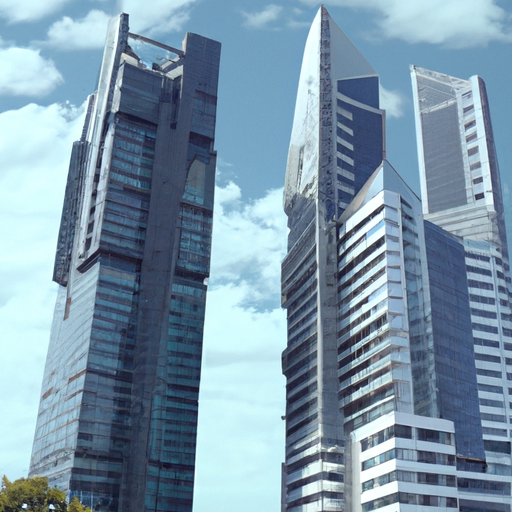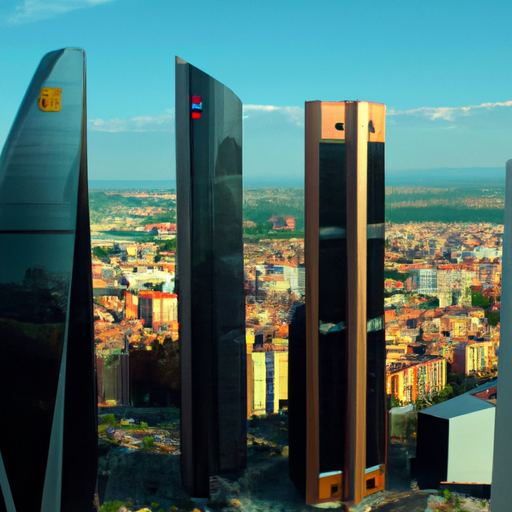
The Impact of COVID-19 on Business Travel: A Look at Meliá’s Expectations for Q4
The COVID-19 pandemic has had a profound impact on various industries, and one of the hardest-hit sectors has been business travel. With travel restrictions, lockdowns, and a general fear of the virus, companies around the world have significantly reduced their travel budgets. However, there is hope on the horizon as Meliá Hotels International, one of the world’s largest hotel chains, expects business travel to rebound to 2019 levels in the fourth quarter of this year.
Meliá’s optimism stems from several factors. Firstly, the global vaccination efforts have been progressing steadily, with more and more people receiving their shots. As vaccination rates increase, the risk of contracting and spreading the virus decreases, making business travel a safer option. Additionally, governments are gradually easing travel restrictions, allowing for more movement across borders. These developments are encouraging for companies that rely on business travel to conduct their operations effectively.
Furthermore, Meliá has been closely monitoring the changing needs and preferences of business travelers. They have observed a growing trend of “bleisure” travel, where professionals combine business trips with leisure activities. This shift in mindset presents an opportunity for hotels to offer unique experiences and amenities that cater to both work and relaxation. By adapting their services to meet these evolving demands, Meliá aims to attract more business travelers and enhance their overall experience.
To ensure the safety and well-being of their guests, Meliá has implemented rigorous health and safety protocols across their properties. These measures include enhanced cleaning procedures, social distancing guidelines, and the use of personal protective equipment by staff members. By prioritizing the health and safety of their guests, Meliá aims to instill confidence in business travelers and alleviate any concerns they may have about staying in hotels during these uncertain times.
Meliá’s expectations for a rebound in business travel are also supported by recent surveys and studies. According to a survey conducted by the Global Business Travel Association, 74% of respondents expect their companies to resume domestic business travel in the near future. This indicates a growing confidence in the recovery of the business travel sector. Additionally, a study by McKinsey & Company suggests that business travel will gradually return to pre-pandemic levels, driven by the need for face-to-face interactions and relationship-building.
While the road to recovery may still have its challenges, Meliá remains optimistic about the future of business travel. They believe that as companies adapt to the new normal and prioritize face-to-face interactions, the demand for business travel will steadily increase. By staying agile and responsive to the changing needs of their guests, Meliá aims to position itself as a trusted partner for business travelers.
In conclusion, Meliá Hotels International expects business travel to rebound to 2019 levels in the fourth quarter of this year. Their optimism is fueled by the progress of global vaccination efforts, the easing of travel restrictions, and the evolving preferences of business travelers. By implementing stringent health and safety protocols and adapting their services to meet changing demands, Meliá aims to attract more business travelers and enhance their overall experience. With surveys and studies supporting the gradual recovery of the business travel sector, Meliá remains hopeful about the future and looks forward to welcoming back business travelers with open arms.
Analyzing the Factors Behind Meliá’s Optimistic Outlook for Business Travel in Q4

Meliá Hotels International, one of the world’s largest hotel chains, is expecting a rebound in business travel to pre-pandemic levels by the fourth quarter of this year. This optimistic outlook comes as a result of several factors that have been analyzed by industry experts.
First and foremost, the successful rollout of COVID-19 vaccines has played a significant role in restoring confidence among business travelers. With more and more people getting vaccinated, the risk of contracting the virus is significantly reduced, making it safer for individuals to resume their business travel activities. This increased sense of safety is expected to drive a surge in demand for hotel accommodations, benefiting companies like Meliá.
Additionally, the gradual easing of travel restrictions and the reopening of borders have also contributed to Meliá’s positive outlook. As countries around the world continue to make progress in controlling the spread of the virus, governments are starting to relax travel restrictions, allowing for more international travel. This is particularly important for business travelers who often need to cross borders to attend meetings, conferences, and other work-related events. The reopening of borders will undoubtedly lead to an increase in business travel, benefiting Meliá’s bottom line.
Furthermore, the pent-up demand for face-to-face interactions and networking opportunities is another factor that supports Meliá’s optimistic outlook. While virtual meetings and conferences have become the norm during the pandemic, many professionals have expressed a longing for in-person interactions. The ability to build relationships, negotiate deals, and collaborate effectively is often enhanced when people can meet face-to-face. As the world gradually returns to normalcy, business travelers are expected to seize the opportunity to reconnect with clients, colleagues, and partners, leading to a surge in demand for hotel accommodations.
Moreover, the rise of remote work and the hybrid work model have also contributed to Meliá’s positive outlook for business travel. As more companies embrace flexible work arrangements, professionals are no longer confined to their home offices. This newfound freedom allows individuals to travel while still fulfilling their work responsibilities. Many professionals are now opting for “workations,” where they combine business travel with leisure activities. This trend is expected to drive an increase in business travel, as professionals seek to explore new destinations while continuing to work remotely.
Lastly, the resilience and adaptability of the business travel industry cannot be overlooked. Throughout the pandemic, hotels and travel companies have demonstrated their ability to adapt to changing circumstances. From implementing rigorous health and safety protocols to offering flexible cancellation policies, the industry has shown its commitment to ensuring the safety and satisfaction of its customers. This adaptability, combined with the factors mentioned earlier, positions Meliá and other hotel chains for a strong rebound in business travel in the fourth quarter.
In conclusion, Meliá Hotels International’s optimistic outlook for business travel in the fourth quarter is supported by several factors. The successful rollout of vaccines, the easing of travel restrictions, the pent-up demand for face-to-face interactions, the rise of remote work, and the adaptability of the industry all contribute to this positive outlook. As the world gradually returns to normalcy, business travelers are expected to resume their activities, benefiting companies like Meliá. With the right strategies in place, Meliá is well-positioned to capitalize on the rebound in business travel and drive its growth in the coming months.
Exploring the Potential Challenges and Opportunities for Meliá as Business Travel Rebounds in Q4
Meliá Expects Business Travel to Rebound to 2019 Levels in Q4
As the world slowly recovers from the impact of the COVID-19 pandemic, businesses are cautiously optimistic about the return of business travel. Meliá Hotels International, one of the world’s largest hotel chains, is no exception. The company is expecting a rebound in business travel to pre-pandemic levels by the fourth quarter of this year. This presents both challenges and opportunities for Meliá as they navigate the changing landscape of the travel industry.
One of the main challenges for Meliá is ensuring the safety and well-being of their guests and employees. The pandemic has heightened awareness of health and hygiene, and travelers are now more concerned than ever about staying in a clean and safe environment. Meliá has responded to this by implementing rigorous cleaning protocols and hygiene measures across all their properties. They have also introduced contactless check-in and check-out procedures to minimize physical contact and reduce the risk of transmission. By prioritizing the health and safety of their guests, Meliá aims to rebuild trust and confidence in business travelers.
Another challenge for Meliá is the changing nature of business travel itself. The pandemic has forced many companies to adopt remote working practices and virtual meetings. While this has been a necessary adaptation, it has also raised questions about the future of business travel. Will companies continue to rely on virtual meetings even after the pandemic is over? Meliá recognizes this potential shift and is adapting their offerings accordingly. They are investing in state-of-the-art technology and infrastructure to provide seamless virtual meeting solutions for their guests. By embracing the hybrid model of business travel, Meliá hopes to cater to the evolving needs of their corporate clients.
Despite these challenges, there are also significant opportunities for Meliá as business travel rebounds. The pent-up demand for face-to-face meetings and networking events is expected to drive a surge in business travel once restrictions are lifted. Meliá is well-positioned to capitalize on this opportunity with their extensive portfolio of hotels and resorts in key business destinations around the world. Their reputation for exceptional service and luxurious accommodations also gives them a competitive edge in attracting business travelers. By offering flexible booking options and tailored packages, Meliá aims to entice corporate clients back to their properties.
Furthermore, the rebound in business travel presents an opportunity for Meliá to showcase their commitment to sustainability. The pandemic has highlighted the importance of responsible travel and environmental stewardship. Meliá has long been a leader in sustainable tourism, and they continue to prioritize sustainability in their operations. From reducing energy consumption to implementing waste management initiatives, Meliá is dedicated to minimizing their environmental impact. By promoting their sustainability efforts to business travelers, Meliá can appeal to companies that prioritize corporate social responsibility and eco-friendly practices.
In conclusion, the rebound of business travel in the fourth quarter of this year presents both challenges and opportunities for Meliá Hotels International. By prioritizing the safety and well-being of their guests, adapting to the changing nature of business travel, and capitalizing on the pent-up demand, Meliá aims to navigate the post-pandemic landscape successfully. With their commitment to sustainability and exceptional service, Meliá is well-positioned to welcome back business travelers and contribute to the recovery of the travel industry.


